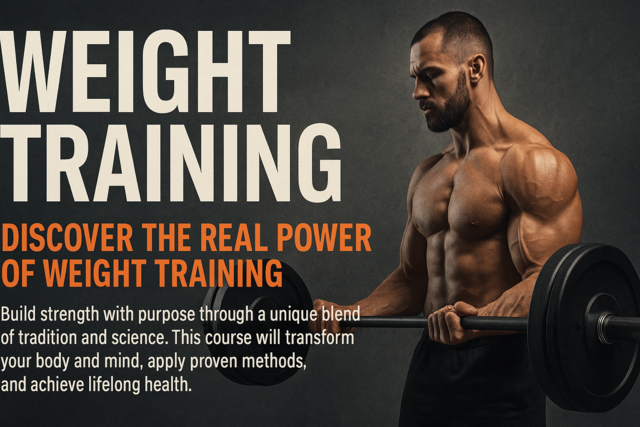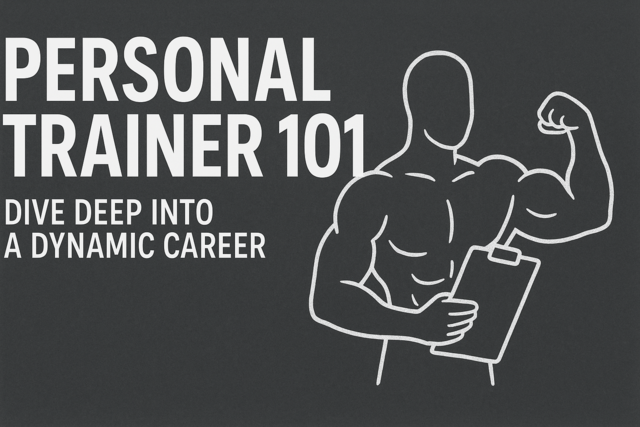Weight Training
Empower Your Strength: Sculpt, Lift, Conquer!

14 Hours average completion time
1.4 CEUs
15 Lessons
30 Exams & Assignments
82 Discussions
15 Videos
16 Reference Files
159 Articles
Mobile Friendly
Last Updated January 2026
Over 5,000 years ago, ancient warriors measured their worth through feats of strength. Power was not just about competition--it symbolized survival, honor, and the pursuit of greatness. Today, while the essence of this quest remains, our understanding of strength has evolved. It's no longer just about lifting heavy weights; it's about mastering the balance of body, mind, and spirit.
This course is your gateway to that evolution. It's more than just gaining muscle--it's about transforming your approach to fitness for lifelong health and mental clarity. Whether you're a complete beginner or a seasoned lifter, this course offers a unique, science-backed approach that cuts through the myths and provides practical, life-changing insights.
Discover the Real Power of Weight Training
So, why weight training? Because it shapes not just your body but your mind. It offers a comprehensive path to fitness--strengthening muscles, boosting metabolism, and sharpening focus. It's the key to burning fat, improving cardiovascular health, and building endurance. Each session is a step toward a stronger, better you.
But here's the difference: true weight training is not about lifting for the sake of lifting. It's about understanding how muscles grow, how to fuel them properly, and how to structure workouts for maximum impact. This course teaches you what exercises to do, why they matter, and how to tailor them to your unique body and goals.
Why This Course Is Essential
In a world full of fitness advice, it's easy to feel overwhelmed. This course stands as a trusted guide, rooted in science and proven methods. We go beyond quick fixes, diving deep into how muscles work, how to prevent injuries, and how to push past plateaus. With this knowledge, you'll unlock new levels of growth and strength.
But it's not just about the science; it's about transformation. This course empowers you to visualize the person you want to become and equips you with the tools to achieve it. Imagine the confidence you'll gain when you know how to sculpt your muscles with precision and create a strong core that supports every movement.
Build Strength with Purpose
From understanding how genetics influence muscle growth to mastering the perfect exercise sequence, this course covers the details that make all the difference. You'll learn to harness progressive overload--pushing your muscles beyond comfort to trigger growth--while keeping safety at the forefront. We guide you through setting realistic, achievable goals and creating a personalized roadmap to success.
And it's not just about the gym. We know nutrition is the cornerstone of any effective training program. You'll learn how to fuel your body before and after workouts, balance nutrients, and understand the role of supplements. Whether you're aiming to build lean muscle, shed fat, or increase your energy, our holistic approach has you covered.
The Ultimate Blend of Tradition and Science
What sets this course apart is its balance between ancient wisdom and modern science. We respect the time-tested principles of strength training, while also embracing the latest advances in sports science. You'll learn classic techniques like the bench press but also discover innovative exercises and recovery methods that today's top athletes use.
Life is busy, and we make every concept practical and easy to apply. You'll gain strategies to integrate into your routine right away--whether you're training in a gym or at home. This course ensures you're equipped with everything you need for real, lasting results.
Embrace Your Strength Journey
Imagine looking in the mirror and seeing not just stronger muscles but also a new resilience and confidence. Weight training isn't just physical--it's about building mental strength, pushing through challenges, and finding joy in the process. This course is a community where you'll find support, answers, and a place to celebrate each milestone.
Now is the time to take control of your fitness journey. This course is your commitment to a stronger future. Every minute you invest will pay off in strength, vitality, and confidence. Enroll now, and let's start building the body--and mindset--you've always wanted. Your journey to unparalleled strength begins here.
- Confidence and resilience through physical challenges
- Strategic exercise sequencing for maximum impact
- Enhanced mental focus and clarity
- Understanding of muscle growth mechanics
- Injury prevention techniques and safe practices
- Knowledge of effective nutrition strategies
- Balanced muscle development and core stability
- Insights into progressive overload principles
- Increased muscle strength and endurance
- Improved body composition and metabolism
- Ability to tailor exercises to individual goals
-

Understanding Addictions
-

Cooking Class Bundle: 5 Cooking Courses
-

Stress Management
-

Personal Trainer 101
-

Creative Writing 101
-

Etiquette Consultant
-

Weight Loss Management
-

Photoshop Elements 101
-

Understanding Concussions
-

Investing 301: Investment Banking
-

Become a Life Coach - Course Bundle
-

Wellness Coaching
-

Life Coaching 101
-

Beyond the Crust: The Heart and Soul of Bread Baking
-

All About Herbs
-

SEO Copywriting
-

Life on Your Terms: Awaken Your Inner Coach
-

How to Run a Dog Day Care
-

Accounting & Bookkeeping 101 for Everyone
-

Nutrition 101
-

Effective Communication Skills
-

How to Bake Cookies
-

World War I
-

Candle Making
-

Freshwater Fishing